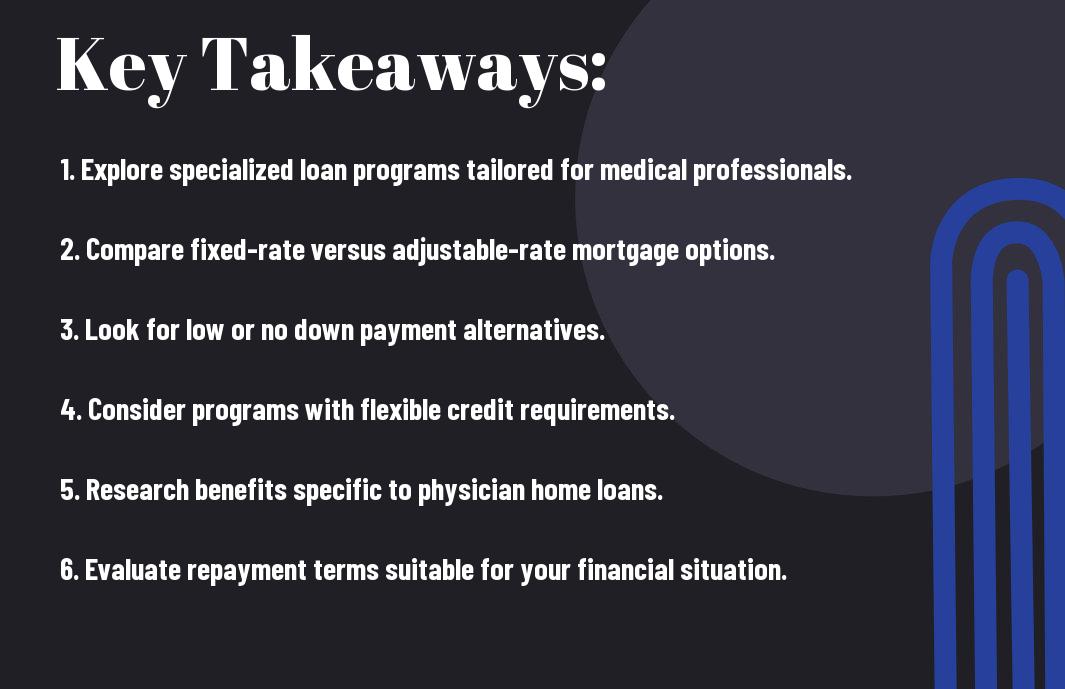With your demanding schedule and unique financial circumstances, finding the right home loan can feel overwhelming. Fortunately, there are tailored mortgage options specifically designed for medical professionals like you. This blog post will explore the top home loan programs available for doctors, outlining the benefits and requirements of each option. Whether you’re a recent graduate or a seasoned practitioner, understanding these choices can empower you to make an informed decision that aligns with your financial goals.
Understanding Home Loan Options
While navigating the world of home loans, it’s imperative to explore various options tailored to your needs as a doctor. Each loan type comes with its own set of benefits and requirements, allowing you to choose the most suitable program based on your financial situation, career path, and long-term goals. Understanding these home loan options can empower you to make informed decisions during the home-buying process.
Conventional Loans
Beside government-backed loans, conventional loans are a popular choice for many doctors. These loans are not insured or guaranteed by the federal government and typically require a higher credit score and down payment. However, they can offer competitive interest rates and the advantage of avoiding private mortgage insurance (PMI) if you put down at least 20%. This option is ideal for those looking for flexibility and long-term investment potential.
FHA Loans
Loans backed by the Federal Housing Administration (FHA) are another viable option for doctors, especially those who are early in their careers or have lower credit scores. FHA loans feature lower down payment requirements and more lenient credit guidelines, making homeownership accessible. This can be particularly beneficial if you have student loans or other financial obligations that impact your overall debt-to-income ratio.
Plus, FHA loans can provide refinancing options and allow for additional funds to cover closing costs, easing your financial burden as you transition into homeownership. If you’re concerned about upfront costs, the ability to put down as little as 3.5% can make this program particularly appealing. Exploring FHA loans could open the door to your dream home sooner than you expect.


Specialty Loans for Doctors
If you are a physician or in the medical field, specialty loans tailored specifically for you can provide significant advantages. These programs are designed to meet the unique financial circumstances you may face, especially as you start your career or take on considerable debt from student loans. With favorable terms and conditions, these loans can be an excellent choice for financing your home.
Physician Loans
With physician loans, you can benefit from low down payment requirements and no private mortgage insurance (PMI). These loans are specifically created to accommodate the financial profiles of new doctors, allowing you to buy your first home without the burdensome costs typically associated with home financing.
Jumbo Loans
Doctors often seek jumbo loans when they want to purchase high-value properties exceeding conventional loan limits. As a medical professional, your stable income and potential for future earnings make you an appealing candidate for these types of loans despite the larger amounts involved.
For instance, if you’re looking to buy a home in an upscale area where property values are significantly higher than average, a jumbo loan can help you secure the property without exceeding your budget. These loans may come with stricter credit requirements, but as a physician, your strong financial profile can work to your advantage, allowing you to access loans up to several million dollars with competitive interest rates and flexible terms.
Qualifying for a Home Loan
Once again, the process of qualifying for a home loan can vary based on factors such as lender requirements, loan type, and your financial situation. As a doctor, you may have unique advantages, such as higher income potential and specific loan programs tailored for your profession. It’s imperative to understand what lenders look for when reviewing your application, including your income, credit score, and overall financial health to secure the best mortgage option for you.
Income Considerations
Around your income, lenders will evaluate your debt-to-income (DTI) ratio to determine your ability to manage mortgage payments alongside existing debts. As a physician, your earning potential is generally high, but if you’re just starting your career or still in residency, you may have lower income levels. Be prepared to provide documentation of your earnings, including pay stubs, tax returns, and any future employment contracts, to support your loan application.
Credit Score Requirements
Beside your income, credit score plays a vital role in determining your eligibility for a home loan. Lenders typically look for a minimum credit score of 620 to 640 for conventional loans, though many doctors aim for scores above 700 for better rates and terms.
In fact, having a high credit score can significantly impact your loan approval process and help you secure lower interest rates, which can save you thousands of dollars over the life of your mortgage. To maintain a favorable credit score, it’s imperative to manage your existing debts responsibly, make payments on time, and avoid large credit inquiries before applying for a home loan. By focusing on your credit health, you can ensure you are well-prepared to take advantage of the best home loan options available to you as a medical professional.
Down Payment Assistance Programs
Keep in mind that down payment assistance programs are designed to help you manage the financial hurdles of buying a home. These programs can significantly lighten your upfront costs, allowing you to secure a mortgage with a smaller down payment or possibly none at all.
State and Local Programs
Programs offered by various state and local governments can provide substantial assistance for homebuyers like you. These initiatives often include down payment grants, loans with favorable terms, or direct financial aid specifically tailored to first-time homebuyers or professionals in certain fields.
Grants and Forgivable Loans
To unlock additional resources, consider exploring grants and forgivable loans available to you as a doctor. These options can cover significant portions of your down payment and may not require repayment if you meet specific criteria.
Plus, many grants and forgivable loans are designed for professionals such as yourself, helping to make homeownership more accessible. These financial aids often have minimal restrictions and can even be combined with other financing options, making them an attractive choice for your home purchase journey.
Comparing Interest Rates and Terms
Many factors influence the choice of home loan, particularly interest rates and terms. Understanding how these elements affect your mortgage can help you make informed decisions. Below is a simplified comparison of standard options available to you:
| Interest Rate Type | Details |
|---|---|
| Fixed Rate | Interest rate remains constant throughout the loan term. |
| Variable Rate | Interest rate can change based on market conditions. |
Fixed vs. Variable Rates
Against fixed rates, variable rates can provide initial lower payments, but they may fluctuate over time. If you prefer stability, a fixed rate offers predictability in your budget, whereas a variable rate can potentially save you money but carries a risk of increasing payments.
Loan Duration Options
To choose a loan term, you need to consider how long you plan to stay in your home. Shorter terms often mean higher monthly payments but save you money on interest in the long run, while longer terms provide lower monthly payments but accumulate more interest over time.
Rates for various loan durations typically vary, so it’s beneficial to assess how each option aligns with your financial situation and long-term plans. If you expect to stay in your home for a short period, a 15-year term might be ideal, whereas a 30-year term could offer more flexibility if you anticipate being there longer. Analyze your cash flow and budget to determine the best fit for you.
Closing Costs and Other Fees
Not all home loan options come without additional expenses. Understanding closing costs and other fees is vital for you as a doctor when financing a new home. These costs can affect your overall mortgage budget and vary depending on your loan type and lender. It’s wise to inquire about these fees upfront to avoid any surprises during the closing process.
Typical Closing Costs
About 2% to 5% of the home’s purchase price will often be allocated for closing costs, which can include loan origination fees, appraisal fees, title insurance, and more. As you prepare for your new mortgage, ensure you factor in these costs to gain a comprehensive understanding of your financial commitment.
Negotiating Fees
Beside knowing what to expect with closing costs, you can often negotiate certain fees with lenders or service providers. Many professionals understand the competitive nature of the market and may be willing to adjust costs, especially if you communicate your needs clearly.
Further, don’t hesitate to shop around and ask for itemized estimates from multiple lenders. This allows you to compare fees and ensures that you can point out any discrepancies. Many lenders offer flexibility in fees, and you might find options to waive or reduce specific charges. By actively engaging in discussions about fees, you put yourself in a stronger position to save money in the long run.
To wrap up
Now that you’ve explored the top home loan options available for doctors, you can make an informed decision about which program fits your financial situation and lifestyle best. Each option offers unique benefits tailored to your needs as a medical professional, allowing you to maximize your investment potential. Take your time to evaluate your options, considering factors such as down payment requirements, interest rates, and repayment terms. By understanding these home loan offerings, you can choose the right path to homeownership that aligns with your goals.




